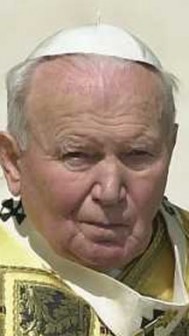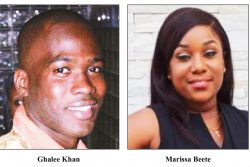VATICAN CITY, (Reuters) – Is Pope John Paul II approaching his halo too fast?

As the Vatican prepares to elevate the late pontiff one step closer to sainthood this Sunday, the Catholic world is caught up with beatification fever.
Rome is festooned with posters of the former pope on buses and lamp posts as the city where he was bishop for 27 years awaits one of the largest crowds since his funeral in 2005, when millions came to pay tribute.
At least several hundred thousand people are expected at the mass in St Peter’s Square where his successor, Pope Benedict XVI, will pronounce a Latin formula declaring one of the most popular popes in history a “blessed” of the Church.
The frenetic preparations in Rome, in John Paul’s native Poland and around the world, have matched the buildup for Friday’s royal wedding in London and drowned out the voices of a minority of Catholics asking “Why the rush?”.
The answer depends on the definition of sainthood.
“The official judgement of the church is catching up with the spontaneous judgement of the people of the church,” said American theologian and papal biographer George Weigel.
“What’s happening is the acknowledgement of a Christian life nobly lived and one from which we can all take inspiration,” Weigel, who knew the pope, told Reuters.
At John Paul’s funeral in 2005, the crowd chanted the now famous phrase “Santo Subito” (Make him a saint now).
Benedict, who was elected in a secret conclave several weeks later, decided not to do that but did waive a church rule that normally requires a five-year waiting period before the bureaucratic preliminaries to sainthood can begin.
John Paul’s beatification has set a speed record for modern times, taking place six years and one month after his death on April 2, 2005.
His life, works and writings were scrutinised and the requirements for beatification were complete when the Vatican deemed that the unexplained cure of a French nun suffering from Parkinson’s disease, who prayed to him after he died, was due to John Paul’s intercession with God to perform a miracle.
After the beatification, another miracle will have to be ascribed to John Paul for him to become a saint. Many think this is a foregone conclusion and just a matter of time.
Amid the jubilation, a dissenting minority has spoken up.
OUTSPOKEN
MINORITY
“I have genuine regard for the man — his heroic youth, sterling authenticity, historic courage in confronting the communist regime in Poland. He is properly honoured for all of that,” said James Carroll, a prominent U.S. author and columnist who is a former priest.
“But sainthood is something else. I believe he inflicted massive damage on the church in numerous ways. I also think the Vatican has a self-interested agenda in the saint-making process in general and in John Paul’s in particular.
It is an attempt to shore up its own hollow authority,” he told Reuters.
Liberals in the church say John Paul was too harsh with theological dissenters who wanted to help the poor, particularly in Latin America. Some say John Paul should be held ultimately responsible for the sexual abuse scandals because they occurred or came to light when he was in charge.
Ultra-conservatives say he was too open to other religions and allowed the liturgy to be “infected” by local cultures, such as African dancing, on his trips abroad.
Some have expressed doubt about the “miracle” cure of the French nun who was suffering from Parkinson’s, the same disease that debilitated the pope for the last 12 years of his life.
“Imagine the damage to the Church’s credibility should this nun eventually suffer a return of her symptoms,” the conservative Catholic newspaper The Remnant said.
One person who is not taking sides is Raimondo Zarfatti, who sells souvenirs near the Vatican. “I sell 90 percent John Paul memorabilia and 10 percent Benedict items,” he told Reuters.
If his sales are an indication, the people have voted.








